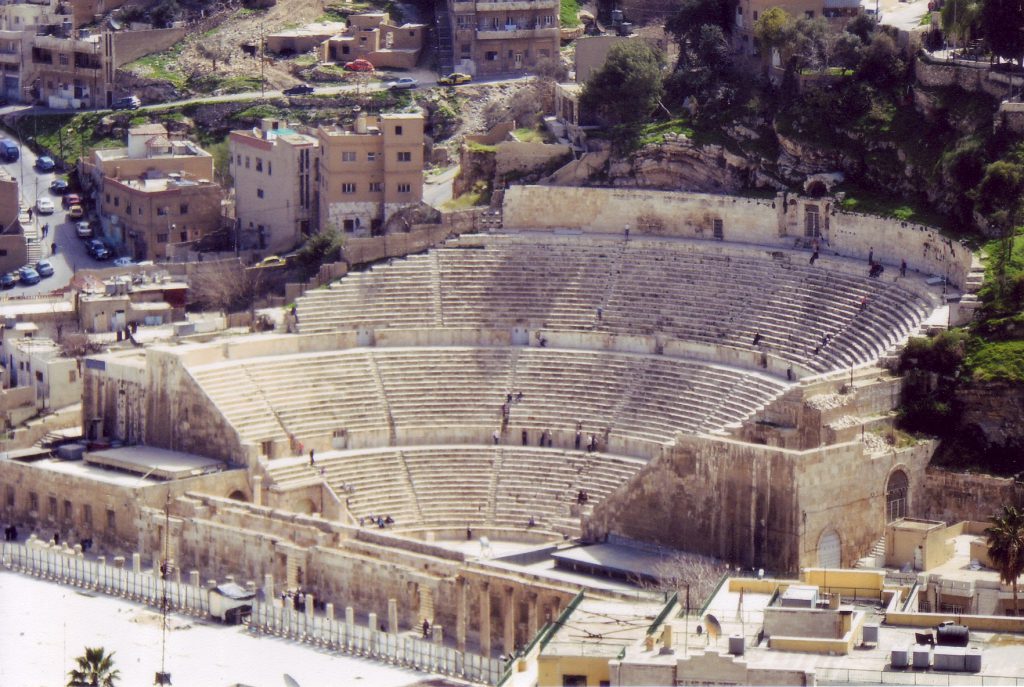
Roman Theater in Amman

Roman Theater in Amman
GENERAL INFORMATION
Jordan is an Arab kingdom in Western Asia, on the East Bank of the Jordan River. Jordan is bordered by Saudi Arabia to the east and south; Iraq to the north-east; Syria to the north; Israel, Palestine and the Dead Sea to the west; and the Red Sea in its extreme south-west. Jordan is strategically located at the crossroads of Asia, Africa and Europe. The capital, Amman, is Jordan’s most populous city as well as the country’s economic, political and cultural center.
Jordan is a relatively small, semi-arid, almost-landlocked country with a population numbering 9.5 million. Sunni Islam, practiced by around 92% of the population, is the dominant religion in Jordan. It co-exists with an indigenous Christian minority. Jordan is considered to be among the safest of Arab countries in the Middle East. The kingdom is also a refuge to thousands of Iraqi Christians fleeing the Islamic State. While Jordan continues to accept refugees, the recent large influx from Syria placed substantial strain on national resources and infrastructure.
Although the Jordanian economy is one of the smallest economies in the region, it is still attractive to foreign investors because of skilled workforce and as a touristic destination.
Despite persistent bureaucratic obstacles and delays, reforms carried out in recent years have made business formation and operation more efficient and dynamic.
Trade is important to Jordan’s economy; the value of exports and imports taken together equals 98 percent of GDP. The average applied tariff rate is 4.0 percent. The government screens foreign investment and restricts investment in some sectors of the economy. Along with financial-sector policies that are intended to enhance competition and efficiency, banking supervision and regulation generally conforms to international standards.
Over the past 10 years, Jordan has pursued structural reforms in education, health, as well as privatization and liberalization. The Government of Jordan has introduced social protection systems and reformed subsidies, creating the conditions for public-private partnerships in infrastructure and making tax reforms.
The Jordan PIT is the only tax on personal income in Jordan. There are no other taxes on personal income imposed at the local level.
The corporate tax rates in Jordan are applied based on the industry/business activities from which the taxpayer generates income. According to the income tax law, the corporate tax rates are as follows:
For foreign branches of Jordanian resident corporations, all of the branch net income is taxed at a fixed rate of 10%.
– For several years the country has registered substantial growth and the Jordanian market is opening progressively.
– The government has made a remarkable effort in controlling public spending, which has placed Jordan among the most dynamic countries in the Middle East.
– Jordan has also backed the human factor and its workforce is among the best-trained ones in the Arab world.
– The country is politically stable.
– Its geographical location is also an important asset.
– The agreements signed by the country have given Jordan access to more than a billion potential consumers.
– In a political level, Jordan is located in an unstable region being near Iraq, Syria and Israel.
– On the domestic front, the massive influx of Iraqi refugees, added to a considerable number of Palestinian refugees, may represent a risk factor.
– In addition, Jordan does not have many natural resources and remains a modest market in comparison with Egypt or its Gulf neighbors.